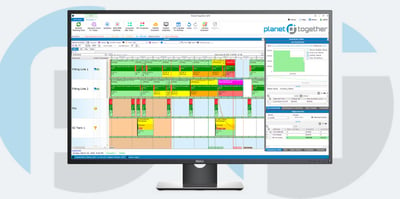Swarm Intelligence for Production Scheduling in Complex Environments
In the rapidly evolving landscape of medical manufacturing, plant managers face a daunting challenge: ensuring efficient production in a complex environment while maintaining the highest standards of quality and compliance. With the increasing complexity of products, regulatory requirements, and global supply chain dynamics, traditional methods of production scheduling fall short.
In this blog, we will explore how swarm intelligence, combined with cutting-edge software integration, can revolutionize production scheduling for medical manufacturing facilities. We will specifically discuss the integration of PlanetTogether with leading ERP, SCM, and MES systems such as SAP, Oracle, Microsoft, Kinaxis, and Aveva.

The Complexity of Medical Manufacturing
Medical manufacturing facilities are unique in their complexity. They must navigate a labyrinth of regulations, stringent quality controls, and an ever-evolving product portfolio. In addition, the demand for medical devices and pharmaceuticals is highly variable, making it challenging to create efficient production schedules that optimize resources and minimize costs.
Traditional scheduling methods, relying on human expertise and static planning, struggle to keep up with the dynamic nature of medical manufacturing. This is where swarm intelligence comes into play, offering a powerful solution to these challenges.

Swarm Intelligence: Nature-Inspired Optimization
Swarm intelligence draws inspiration from the collective behavior of social insects like ants, bees, and birds. These creatures exhibit remarkable coordination and problem-solving abilities as a group, even though individual members may possess limited intelligence. In the same way, swarm intelligence algorithms harness the power of decentralized decision-making to find optimal solutions in complex environments.

Implementing Swarm Intelligence in Production Scheduling
Integrating swarm intelligence into your production scheduling process can bring about several benefits:
Real-time Adaptability: Swarm intelligence algorithms continuously adapt to changing conditions. This enables your production schedule to respond swiftly to unforeseen disruptions, such as machine breakdowns or supply chain issues, minimizing downtime.
Improved Optimization: Swarm algorithms can explore a vast solution space efficiently, leading to better resource utilization, reduced lead times, and lower production costs.
Reduced Complexity: The complexity of medical manufacturing can overwhelm traditional scheduling methods. Swarm intelligence simplifies the decision-making process by distributing it among autonomous agents, making it easier to manage complex operations.
Enhanced Decision Support: By integrating swarm intelligence with advanced data analytics, you gain insights into your manufacturing process that were previously hidden. This data-driven decision support system allows you to make more informed choices.
![]()

PlanetTogether: The Foundation of Swarm Intelligence
PlanetTogether is a leading advanced planning and scheduling (APS) software that is designed to address the intricate production scheduling needs of medical manufacturing facilities. Its integration capabilities with popular ERP, SCM, and MES systems make it the ideal platform for implementing swarm intelligence.
The integration with systems like SAP, Oracle, Microsoft, Kinaxis, and Aveva enables seamless data exchange, ensuring that your production schedule is always aligned with the latest demand forecasts, inventory levels, and resource availability. This real-time data exchange is crucial for the success of swarm intelligence algorithms, as they rely on accurate and up-to-date information to make decisions.
Let's look into how PlanetTogether can be integrated with these systems to enhance production scheduling:
Integration with SAP: SAP is a widely used ERP system in medical manufacturing. By integrating PlanetTogether with SAP, you can synchronize your production schedule with SAP's master data, including bill of materials (BOM), work orders, and resource capacities. This two-way integration ensures that any changes made in either system are reflected in real-time.
Integration with Oracle: Oracle's ERP solutions offer comprehensive support for medical manufacturing processes. Integrating PlanetTogether with Oracle enables you to leverage Oracle's data for demand forecasting, inventory management, and quality control. This integration streamlines the flow of information between systems, allowing swarm intelligence algorithms to make informed scheduling decisions.
Integration with Microsoft: Microsoft's suite of tools, including Dynamics 365, plays a significant role in managing operations in medical manufacturing. Integrating PlanetTogether with Microsoft systems provides a unified platform for planning, scheduling, and execution. This integration ensures that data flows seamlessly between PlanetTogether and Microsoft applications, fostering better collaboration and decision-making.
Integration with Kinaxis: Kinaxis RapidResponse is a popular supply chain management platform used in medical manufacturing. By integrating PlanetTogether with Kinaxis, you can create a holistic view of your supply chain and production operations. This integration facilitates real-time updates on supply chain disruptions, helping swarm intelligence algorithms adjust production schedules accordingly.
Integration with Aveva: Aveva's Manufacturing Execution System (MES) is essential for real-time shop floor control in medical manufacturing. Integrating PlanetTogether with Aveva MES ensures that your production schedule is synchronized with shop floor activities. This seamless connection enables you to respond quickly to shop floor events, such as machine breakdowns or quality issues.
The Benefits of Integration
Integrating PlanetTogether with these ERP, SCM, and MES systems brings about several advantages for your medical manufacturing facility:
Data Accuracy: Integration ensures that your production scheduling algorithms have access to the most accurate and up-to-date data, resulting in more reliable scheduling decisions.
Efficiency: Automated data exchange eliminates the need for manual data entry and reduces the risk of errors. This streamlines your operations and saves time.
Visibility: Integration provides end-to-end visibility into your production process, from demand forecasting to shop floor execution. This visibility allows you to make proactive decisions and optimize your resources.
Scalability: As your medical manufacturing facility grows, the integrated system can scale with you. This scalability ensures that your scheduling capabilities remain robust and efficient.
Compliance: The integration of ERP systems like SAP and Oracle ensures that you can easily track and maintain compliance with regulatory requirements, a critical aspect of medical manufacturing.

Implementing Swarm Intelligence with PlanetTogether
Now that we've explored the benefits of integrating PlanetTogether with ERP, SCM, and MES systems, let's take a closer look at how swarm intelligence can be applied within the PlanetTogether environment:
Multi-Agent Systems: PlanetTogether employs multi-agent systems (MAS) to emulate swarm intelligence. Each agent represents a component of your manufacturing process, such as machines, workstations, or operators. These agents communicate and collaborate to find the optimal production schedule.
Dynamic Scheduling: Swarm intelligence-based scheduling is inherently dynamic. Agents continuously exchange information, adapting the schedule in real-time to address changing priorities, resource availability, and unforeseen events.
Parallel Exploration: Swarm algorithms explore multiple scheduling possibilities simultaneously, significantly reducing the time needed to find optimal solutions. This parallel exploration is essential for handling the complexity of medical manufacturing.
Conflict Resolution: In a complex manufacturing environment, conflicts can arise between different scheduling objectives, such as meeting customer demand and minimizing production costs. Swarm intelligence algorithms excel at resolving such conflicts by prioritizing and balancing competing goals.
Machine Learning Integration: PlanetTogether's integration with machine learning technologies enhances swarm intelligence by allowing the system to learn from historical data and make more accurate predictions about future events, such as machine failures or supply chain disruptions.
In the complex world of medical manufacturing, production scheduling is a critical function that can make or break a facility's success. Traditional methods are no longer sufficient to navigate the intricacies of the industry, which is why swarm intelligence, coupled with advanced planning and scheduling software like PlanetTogether, offers a transformative solution.
By integrating PlanetTogether with ERP, SCM, and MES systems such as SAP, Oracle, Microsoft, Kinaxis, and Aveva, plant managers can harness the power of swarm intelligence to optimize their production schedules. This integration brings real-time data exchange, improved accuracy, and scalability to the scheduling process, enabling medical manufacturing facilities to thrive in the face of ever-changing demands and regulations.
Incorporating swarm intelligence into your production scheduling not only improves efficiency and resource utilization but also ensures that your facility remains agile and competitive in the dynamic landscape of medical manufacturing. Embracing this technology is a step toward achieving higher productivity, better quality, and enhanced compliance – essential elements for success in the healthcare industry.
Are you ready to take your manufacturing operations to the next level? Contact us today to learn more about how PlanetTogether can help you achieve your goals and drive success in your industry.
Topics: Data Accuracy, PlanetTogether Software, Integrating PlanetTogether, Real-Time Data Exchange, Improved Accuracy, Adherence to Regulatory Compliance, Machine Learning Integration, Enhance Visibility, Improve Scalability to the Scheduling Process, Medical Manufacturing, Swarm Intelligence




















LEAVE A COMMENT